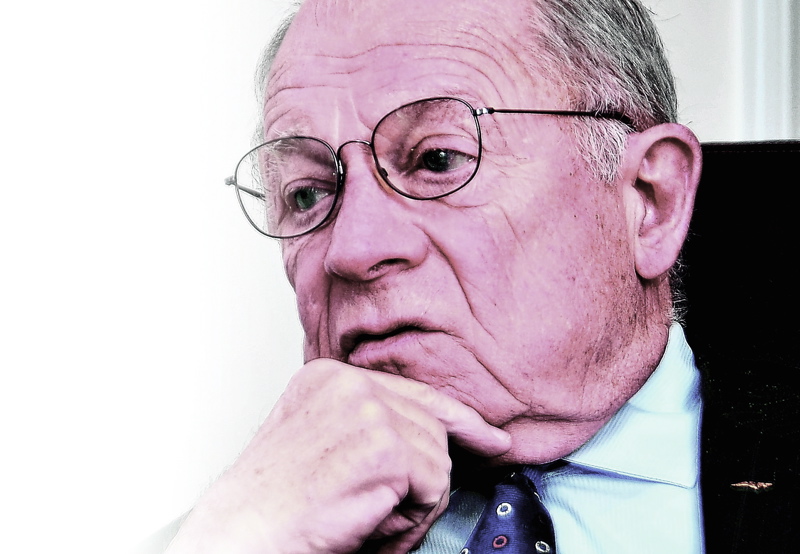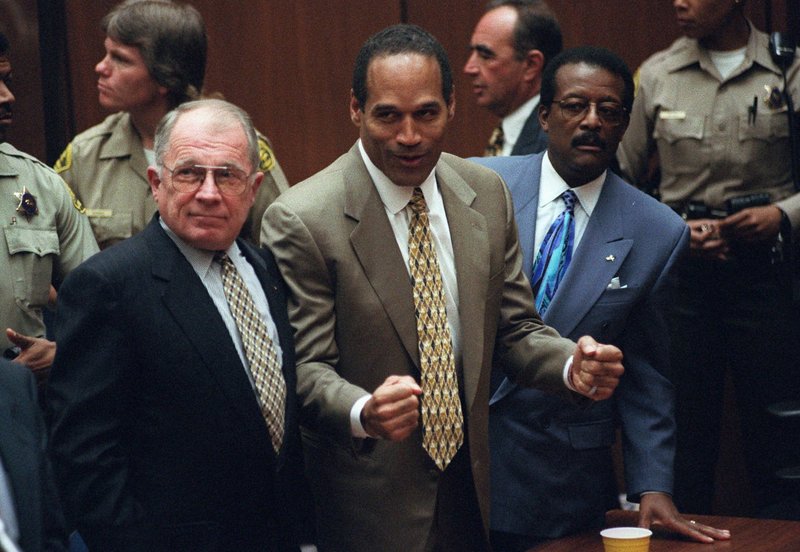YARMOUTH – Former O.J. Simpson defense lawyer F. Lee Bailey is out to set his record straight.
In his first written account of the 1995 Simpson murder trial, Bailey reveals a never-called witness that he claims could have proved Simpson’s innocence.
It’s also an emotional appeal to critics who, the Yarmouth resident says, have questioned his integrity.
“Hopefully, those who read what I have set forth here will at least understand why I have never, ever wavered in my assertions that O. J. Simpson did not harm or kill anyone the night his former wife and her friend were butchered,” Bailey, 77, writes in the 46-page document posted today on his website, www.baileyandelliott.com.
In addition to describing the alleged eyewitness, a neighbor walking his dog near the crime scene, Bailey lets readers in on behind-the-scenes details.
In one section, he describes his decision to purposely goad a prosecutor into changing his mind about asking Simpson to try on the infamous leather glove, and his attempt to cut a deal with the National Enquirer so it would offer a $2 million reward in exchange for access to Simpson.
Written in a very personal, conversational style — he quips that the so-called “high-speed chase” was more of a “high-tension escort” — Bailey puts his own feelings on display. He did the same in an interview last week, saying that the paper is in part a response to years of personal attacks on his character.
“So many people said, ‘You are the reason he got off.’ It is very frustrating, a terribly raw deal,” Bailey said. “It’s unfinished business … I would like to be able to finish the case and put every witness (on the stand).”
Bailey said he may expand the document, titled “The Simpson Verdict by F. Lee Bailey,” into a book. Bailey was one of numerous attorneys on the so-called “Dream Team” hired by the former professional football star after he was charged with murdering his ex-wife, Nicole Brown Simpson, and her friend Ron Goldman.
Simpson was acquitted on the murder charges but has remained a high-profile and polarizing figure in the wake of the trial.
Most recently, Simpson was sentenced to serve 33 years for kidnapping and armed robbery after a failed attempt to recover sports memorabilia in Arizona.
“I am convinced that he sits in jail today because a jury in Nevada believed it was punishing him because he ‘beat the rap’ for these two murder charges,” Bailey wrote.
Several people closely tied to the murder case have published books, from journalists covering the trial to defense attorney Robert Shapiro, detective Mark Fuhrman, appellate adviser Alan Dershowitz, lawyer Gerald Uelmen and Simpson himself.
But Bailey chose not to publish anything earlier because he thought people were still too biased to consider Simpson’s innocence.
“I had always decided to move forward, but was convinced it would take time until anyone has an open mind,” he said. He acknowledged his steady support of Simpson’s innocence has been “terribly unpopular.”
Bailey said he has been cast by many as helping a guilty man go free. Even some lawyers still tell him, “You did a hell of a job, but he got away with it.”
“It is the most sustained assault on my credibility that I have ever experienced,” Bailey said. “Why — if I knew he was guilty — why go around taking this abuse?”
Laurie Levenson, a professor of law at Loyola Law School who attended the trial and still follows the case, said she doubts the case sullied Bailey’s reputation. Most people associate defense leader Johnnie Cochran with the case, she said.
“(Bailey) was part of the team, but certainly not the leader. I don’t think most of the world knows he represented O.J. He was competing with other lawyers that had (more) face time,” Levenson said.
Levenson suspects Bailey will be better remembered for two other clients: Patricia Hearst — the wealthy newspaper heiress who was kidnapped and then famously helped her captors rob a bank — and Sam Sheppard — a doctor who was convicted, then acquitted, of murdering his pregnant wife.
In the essay, Bailey peppers the thinking behind his legal strategy, including a decision to purposely anger prosecutor Chris Darden during a recess with an attack on his manhood.
When Darden replied, “What the hell do you mean by that?” Bailey told him: “What I mean is that you don’t have the balls to make O.J. try on that glove. If you don’t, I think I will. …”
Immediately after that exchange, Bailey writes, Darden caught up to Judge Lance Ito as he returned to the bench: ” ‘Judge,’ (Darden) spluttered. ‘Mr. Bailey just told me something, and I want the defendant to try on that glove.’ Like so many who act impulsively when goaded, Darden got his wish.”
The picture of Simpson with the apparently too-small glove was one of the enduring images of the trial — and the repeated mantra of Cochran’s closing argument: “If it does not fit, you must acquit.”
Because the jury pool had already been winnowed from 24 people to 14 and a mistrial was possible, Bailey said, the defense chose to cut the trial short and never presented a host of evidence he says proves Simpson’s innocence. Among the issues that Bailey says never made it to the trial are:
• Testimony from the dog-walker, Tom Lang, who said he saw a blond woman arguing with a man near a white Ford F350 pickup truck, with a menacing-looking man crouching roughly 70 feet away. He didn’t think anything of it until the next day, when he learned of the murder. In hindsight, Lang told Bailey that he thinks it was Nicole Brown Simpson he saw that night.
“To my knowledge this is the first time that ninety-nine percent of the world has ever heard of Tom Lang. … He could have said decisively that neither of (those men) was O.J. Simpson,” Bailey wrote.
• The opinion of forensic psychiatrist Bernard Yudowitz, who had interviewed 400 people who had recently committed murder. Yudowitz spent eight hours evaluating Simpson after the murders and determined he wasn’t guilty. “I don’t know why they have this guy in jail. He hasn’t killed anyone,” Bailey said Yudowitz told him.
• The opinion of Lenore Walker, a psychologist who developed the concept of battered woman syndrome to describe the mindset and emotional state of a battered woman. She also examined Simpson and found that “he definitely did not fit the profile of a batterer who murders,” according to Bailey.
Bailey said he first started writing the paper in 2007. If it becomes a book, he said, it will be after he finishes writing an autobiography and a book about cross-examination.
Levenson said even though Simpson continues to fascinate, the trial is of minimal relevance.
“Even if you think he is guilty, the jury found him not guilty,” she said. “It is still a ‘who done it.’ Even this many years out people wonder, and O.J. hasn’t left the news.”
And Levenson doesn’t think Bailey should be criticized for doing his job.
“I’ve never thought the lawyer’s views in the case are critical. His job is to represent his client within the ethics boundary of the law,” she said.
Staff Writer Jonathan Hemmerdinger can be reached at 791-6316 or:
jhemmerdinger@mainetoday.com
Copy the Story Link
Send questions/comments to the editors.





Success. Please wait for the page to reload. If the page does not reload within 5 seconds, please refresh the page.
Enter your email and password to access comments.
Hi, to comment on stories you must . This profile is in addition to your subscription and website login.
Already have a commenting profile? .
Invalid username/password.
Please check your email to confirm and complete your registration.
Only subscribers are eligible to post comments. Please subscribe or login first for digital access. Here’s why.
Use the form below to reset your password. When you've submitted your account email, we will send an email with a reset code.